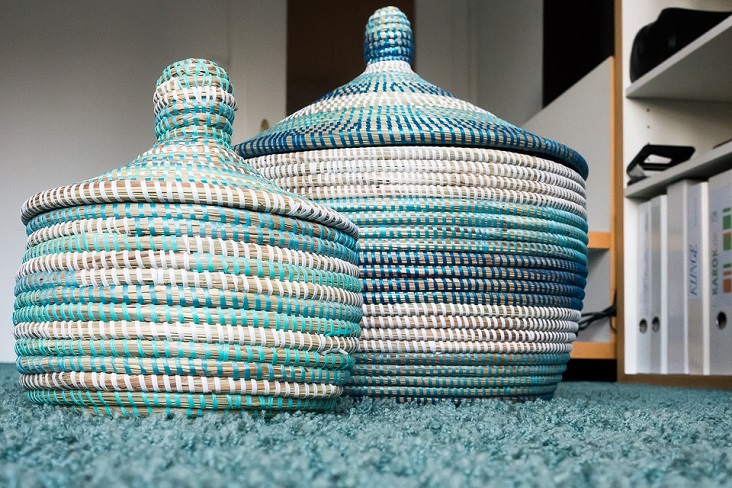From Zenned-out life hackers to interior decorating gurus, lately it seems like everyone is in love with decluttering. And no wonder. Clutter isn’t just something HGTV made up to sell magazines. It’s been scientifically proven to affect your mental health and concentration. For example, the Princeton University Neuroscience Institute reportedly found that multiple stimuli —like clothes strewn around your house— overwhelm the visual cortex with too many signals at once, making it hard to focus on mentally demanding tasks.
And most people have no love for the clutter in their lives. When OfficeMax surveyed American workers about the tidiness of their desks, they found this surprising home-related tidbit: a walloping 90 percent of those asked said clutter at home negatively affected their day-to-day lives. In fact, some people have even drawn ties between messy homes and weight, arguing that clutter can often represent a physical manifestation of our emotional state. At the very least, a disorganized home means you spend more time looking for things, and less time doing whatever it is you love. Plus, if your rooms are crowded or overflowing with unnecessary junk, it will definitely feel like you have less space than you do. And stuff that isn’t put away is a magnet for allergens like dust and pet hair, meaning your home’s air quality —and the performance of your HVAC unit— will be affected.

Okay, enough with the decluttering propaganda! The good news is that, when taken on selectively, cleaning projects like these can open up space in your home and free up some of your mental energy, while giving you a chance to give unused objects a good home. Here are some of our best tips to tackle an at-home purge —and keep you sanity in the process.
Avoid the All-Day Cleaning Marathon
When you get all fired up about clearing out your home, it’s tempting to plan a massive 24-hour cleaning spree. But decorating experts say that it’s best to avoid the urge to tackle all your decluttering in one go. For one thing, most people don’t have the stamina (or, let’s face it, the desire) to take on a weekend-long cleaning session. And occasionally, the process can be emotionally draining. We tend to attach a lot of memories and meaning to the objects in our home, so weighing what stays and what goes can certainly tap into your emotional reserves. Instead, divide your home into rooms or zones and spread the project out over several weeks. It might take a little bit longer, but you’ll be glad you saved your weekends for yourself.
Be Realistic About What You Actually Need
The hardest part isn’t the physical work involved in decluttering, it’s detaching yourself from the items in your home that no longer serve you. We invest a lot of our identity into the objects we fill our homes with. We also hang on to things that we don’t actually use or need because they represent the person we hope we will one day be (like the gym equipment you use as a clothes hanger or the golf clubs you still haven’t used). Or maybe they connect you to your past —old Christmas cards or baby clothes. No one but you can make the decision of what to keep, but it’s a good idea to start with the less emotionally-charged items first, and then move on the the harder decisions. In fact, hardcore declutters like Marie Kondo argue that you should only hang onto items that “spark joy” —although we’ve yet to run into a paper towel holder or microwave that filled us with joy yet, so take that advice for what it’s worth.

Don’t Hang Onto Things for All the Wrong Reasons
The empty boxes you might need one day. The sweater that’s all wrong for you that you keep because it was a gift. The extra plates you hold onto in case you have to host a large party. These are all the worst reasons to keep things in your home. Don’t let guilt or a fear of the future motivate your decisions when you’re decluttering, or you’ll end up keeping things you don’t need and don’t want on the slim promise that you might one day need them.
Use the Three-Bin Method
Sorting, cleaning, and organizing your stuff is taxing work to say the least. To make the process a little more streamlined, most interior designers recommend the “three bin method.” Under this system, you sort things into three piles: stuff to keep, stuff to toss, and stuff to donate. Donating items puts a positive spin on the whole process, especially for items that are hard to part with. Instead of throwing your beloved objects away, you can reframe the act as a charitable of giving. By donating or giving these items away, you’ll be giving them a second home to someone who will love and cherish them.
Take Care of Donations Right Away
Your to-be-donated pile can quickly become a clutter hazard if you don’t take these objects to donation centers right away. Let me repeat that: do not leave donated items lying around. These piles quickly unravel into more clutter if you’re not careful, so plan to take donated objects to their respective homes the same day.
Find a Home for Things
Some clutter is obvious: piles of unfolded clothes or stacks of untended mail naturally contribute to messiness in the home. However, some common behaviors —such as dumping your wallet and keys on a dresser, or storing a plethora of cooking gadgets on the counters— also contribute to an overall effect of disorganization throughout the home. As you begin returning your to-keep items to their proper places, think about finding homes for objects that you typically stow on exposed surfaces, like the top of your dresser, your kitchen table, or your bathroom counters. Use a dish or box to hold the contents of your pocket, or add an appliance garage—a closed cupboard that can hold your coffee maker, blender, and other smallish kitchen appliances. Stowing these items in a closed space saves you from bombarded senses and earns you extra countertop space to boot.

Don’t Get Yourself in the Same Mess All Over Again
Clutter doesn’t happen overnight —it’s a slow process, like erosion. It’s so slow, in fact, that it often catches us unaware: one moment your kitchen is clean, and the next time you look, it’s covered in unwanted junk. Your efforts will carry a lot more weight if you make decluttering a part of your daily routine, rather than a once-a-year marathon. For instance, sort through your mail every night and get rid of the junk that you don’t really need. Better yet, go paperless with your bills and avoid that clutter altogether. The same thing goes for gifts you receive and swag you pick up from parties and events. Likewise, make it a habit to avoid impulse buys on purchases you don’t really need. It’ll be better for your financial health, too. And more money means you’ll have more to invest in other home improvement projects that allow you to really feel at ease in your home.
Make the process fun by hosting a clothing swap or selling stuff you don’t use anymore. You’ll stay focused, enjoy yourself, and maybe make some cash on the side.
Also, If you decide to rent a new apartment, you will be thankful you decluttered your mess and live in an organized fashion and packing will be way easier.
The post Decluttering 101: Increase Your Physical Space & Mental Clarity appeared first on Apartment Living Blog.
from Apartment Living Blog https://www.forrent.com/blog/apt_life/decluttering-101-space-mental-clarity/
No comments:
Post a Comment